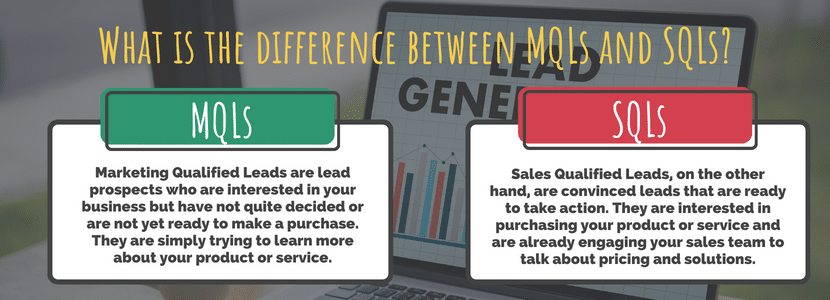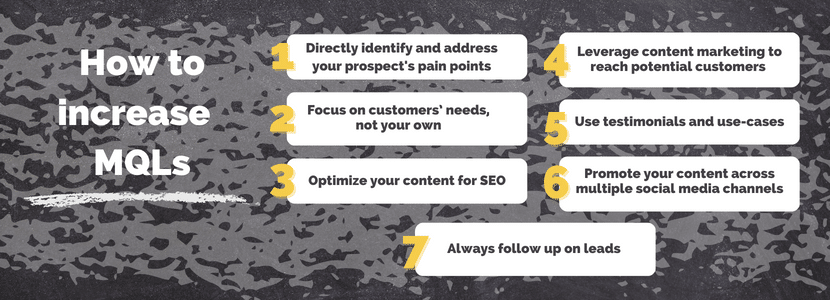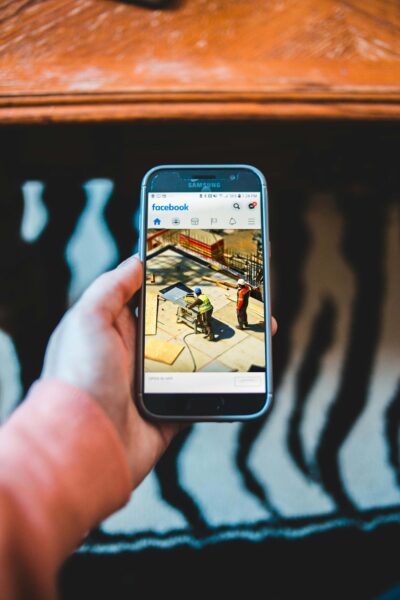Converting leads generated by your lead generation campaign to loyal customers can be a long and difficult process. Let’s face it — some people are simply not interested in what you offer. And some leads are more interested in your product or service than others.
Our agency for lead generation has found that differentiating between ready (Marketing Qualified Leads) and not-so-ready leads is essential, especially for Nashville businesses with a limited marketing budget.
Marketing Qualified Leads are lead prospects who have shown some level of interest in your services and are now actively engaging with your brand.
Below, you’ll learn more about what marketing qualified leads are and how to accurately determine promising prospects generated by your lead gen campaigns.
What are considered qualified leads?
When it comes to lead generation for digital marketing agencies, A qualified lead is, quite simply, a lead prospect that meets certain criteria of an ideal customer as defined by your business. The criteria could be anything related to a lead’s interest and engagement, in terms of both product and fit.
For example, for a marketing agency for leads, a B2B lead is considered qualified when a prospect acts in any of these ways: visits the company’s website or business storefront multiple times, fills out a specific form online or in person at the business, “likes” or interacts with posts on social media, or requests more information on select products or services.
Lead qualification criteria are often industry-specific, so they differ from company to company. They are determined by the internal marketing group, sales team, or an outside marketing agency for leads.
What makes a lead marketing qualified?
A B2B lead is considered marketing qualified when it meets certain parameters established by your marketing team. MQLs are prospects who have shown a certain level of interest or engagement with a company’s marketing efforts, indicating that they may be ready to move on to the next stage of the sales process.
The specific criteria for what constitutes a marketing-qualified B2B lead may vary depending on the business and the industry. Again, you get to set the criteria.
This includes criteria such as:
- The lead’s level of engagement with your website, social media, and email campaigns.
- The amount of time the lead spent on your web page or in your email newsletter.
- How recently and frequently the lead interacted with your content or personnel.
- The products or services the lead is interested in.
- Job title.
- Company size.
- Other demographic criteria.
These criteria help to provide an indication of how likely a lead is to convert into a customer and also help your team prioritize contacts who are more likely to purchase.
If a lead meets the criteria established by your marketing agency lead generation team, they may be considered marketing qualified and can then be moved on to the next stage of your sales process.
What are examples of MQL customer actions?
MQL customer actions are indicators that show a prospect is, at the very least, interested in what you are offering, even if they are not quite yet ready to purchase.
Examples of actions that can indicate an MQL is maybe interested in your services include:
- Filling out a form to download a content offer (for example, a white paper, e-book, case study)
- Requesting a demo or product trial
- Attending a webinar or event
- Engaging with your social media posts or website content
- Subscribing to a company newsletter or blog
- Indicating interest in a specific product or service through website behavior (for example, viewing pricing pages, product pages, etc.)
These actions are not definitive indicators, but they do suggest that the lead has shown interest, and maybe a good candidate for further engagement by the sales team.
What is the difference between MQLs and SQLs?
The main difference between Marketing Qualified Leads (MQL) and Sales Qualified Leads (SQL) is action.

Marketing Qualified Leads are lead prospects who are interested in your business but have not quite decided or are not yet ready to make a purchase. They are simply trying to learn more about your product or service.
Sales Qualified Leads, on the other hand, are convinced leads that are ready to take action. They are interested in purchasing your product or service and are already engaging your sales team to talk about pricing and solutions.
Another major difference is the level of engagement they have with your business.
MQLs have typically taken some sort of action, such as downloading a whitepaper or attending a webinar, that suggests they may be interested in the company’s products or services. MQLs are usually handed off to sales for further qualification. The major goal is to convert an MQL to a SQL.
A Sales Qualified Lead (SQL) has typically gone through a more rigorous qualification process, such as a phone or in-person meeting, and has demonstrated a higher level of interest and intent to purchase.
To use a practical example, let’s say a construction company in Nashville is running a lead generation campaign to generate leads for a new commercial building project.
Here’s an example of how they might differentiate between marketing-qualified leads (MQLs) and sales-qualified leads (SQLs) in this context.
Marketing Qualified Leads are prospects who are:
- Website visitors who have downloaded an e-guide or checklist on commercial building construction.
- Attendees of a webinar or AMA (Ask Me Anything Q&A session) hosted on your website on building design and construction.
- Social media followers who regularly engage with the company’s posts on commercial building projects in Greater Nashville.
- Subscribers to the company’s email newsletter on commercial building construction.
These individuals have shown some interest in the construction company’s services for commercial building projects, but they have not yet been vetted as potential customers.
They are marketing qualified leads (MQLs) because they have taken some action to engage with the company’s marketing efforts and therefore could potentially become customers.
Sales Qualified Leads, on the other hand, may be:
- Website visitors who have filled out a contact form requesting a consultation for a commercial building project.
- Attendees of a live event or trade show who have had a conversation with a salesperson and expressed interest in the construction company’s commercial building services.
- Individuals who have been referred to the company by existing customers or industry professionals in and around Nashville.
- Prospects who have reached out to the company through a phone call or email inquiry.
These individuals have shown a higher level of interest in the construction company’s services and have taken a specific action to express interest in a Nashville commercial building project.
They have been vetted as potential customers and are sales qualified leads (SQLs), meaning they are further along in the sales funnel and are ready for direct sales outreach.
In summary, MQLs are individuals who have engaged with the construction company’s marketing efforts and have shown an interest in commercial building construction, but they have not yet been vetted as potential customers.
What is not an MQL?
Not all leads generated by your lead gen campaign are marketing-qualified. While it might be tempting for small businesses in Nashville to consider every lead as a potential sale, it is important to remember that not all leads are created equal.
Some leads may be interested and have the ability to purchase your product or service but simply do not fit your target market. This should be taken into account when evaluating MQLs because the leads that match your target audience need to be given greater priority.
Additionally, not all leads that make it to the MQL stage are necessarily ready to purchase. They may need further nurturing and guidance before they are ready to commit. Here are some instances of what should not be considered a Marketing Qualified Lead:
Unqualified leads
These are leads that do not meet the company’s target customer profile or have not met the minimum criteria for a marketing-qualified lead.
Junk or spam leads
These are leads that are irrelevant or incorrect, such as spam or fake leads.
Existing customers
Customers who have already purchased from the company cannot be considered as leads.
As a final note, MQLs do not necessarily equal sales. While an MQL indicates a level of interest and engagement, it does not guarantee a sale. Just because a lead prospect is interested in your product does not mean that they are ready to commit.
You should continue engaging with the lead through qualified content and advice in order to convert them into a sales-ready lead.
How to increase marketing qualified leads (MQLs)?
There are many ways to increase the number of MQLs and get more leads into your pipeline. The following tactics can help you identify qualified leads and effectively convert them.
Directly identify and address your prospect’s pain points
When creating content, it is important to focus on addressing their pain points first.
Answering questions like “How will this help to save time?” or “How accurate is it?” can help convert potential customers more effectively than pitching your own features.
Once you have a better understanding of the challenges and pain points that your target audience is facing, you can tailor your marketing messaging and content to address those specific issues.
Focus on customers’ needs, not your own
This approach can help establish your brand as a helpful and knowledgeable resource, and position your products or services as a solution to your audience’s problems.
When creating content, consider factors such as what problem the customer is trying to solve, what questions they may have, and how they research potential solutions. This can help you craft content that speaks directly to them, and, in turn, generate more leads.
This could include blog posts that provide answers to common questions, videos demonstrating product features, case studies highlighting successful outcomes, or webinars providing additional resources.
By providing content that directly addresses your customers’ needs, you can easily attract and retain their interest in your products and services.
Optimize your content for SEO
SEO stands for Search Engine Optimization, which is the process of optimizing a website and its content to be easily discoverable by users searching for terms relevant to the website and its content.
Search engine optimization (SEO) is crucial for businesses that want to improve their online visibility and attract more traffic to their website.
To optimize SEO, businesses should ensure their web content adheres to SEO best practices by:
- Conducting keyword research.
- Creating high-quality content.
- Optimizing meta tags.
- Building quality backlinks.
By following these tips, businesses can improve their online presence, rank higher on search engines, and attract more traffic to their website, leading to increased MQLs and revenue.
Leverage content marketing to reach potential customers
When creating promotion content, include more details, facts and higher semantic richness than usual.
For example, if you’re writing an article about a product launch, don’t just mention the features of the product – go further by describing how it could benefit customers in their daily lives or provide unique solutions that set it apart from competitors.
Additionally, adding infographics and visuals like videos or images can help draw in readers and make the content more engaging.
Always use accurate and data-driven research to back up your claims. Not only will this add credibility to your material, but also it will increase trust in your business.
Use testimonials and use-cases
Showcasing testimonials and use cases is an effective way to increase marketing qualified leads (MQLs) for your business.
When potential customers see positive feedback from others who have used your product or service, it can help build trust and establish credibility, making them more likely to become MQLs.
Here are some ways to leverage testimonials and use cases to increase MQLs:
Showcase customer success stories
Highlight success stories of your customers who have had a positive experience with your product or service. A shout-out from a relatable customer can be a powerful testimony. Include specific details about the challenges they faced and how you helped them overcome those challenges. To protect their privacy, offer to use their first name and initial only of their last name (not their full last name) and incorporate their city or suburb to make them even more relatable.
Feature quotes and reviews
Include quotes and reviews from satisfied customers on your website and marketing materials. These can serve as social proof that you know what you are doing and can be trusted.
Leverage case studies
Provide detailed examples of how your customers have been successful using your product or service. They can be broken down into specific stories to show the tangible benefits that customers are getting from your offering. Use these case studies to demonstrate the value of your product or service to potential customers.
Promote your content across multiple social media channels
To maximize the reach of your content and brand, it’s important to promote across multiple channels. This includes:
- Social media platforms such as Facebook, Instagram, YouTube, and Twitter.
- Email marketing campaigns.
- Search engines, through well-optimized content that follows SEO best practices.
- Any other relevant medium.
By diversifying your promotional efforts, you can engage with a larger number of potential customers and increase leads.
Always follow up on leads
Stay in touch with leads over time, providing them with useful information and gradually building their interest and trust in your brand. Also, optimize your website, so it is easy for interested prospects to always come back.
Ways you can optimize your website to keep prospects interested are:
- Use relevant keywords in the website content, headings, and meta descriptions. This can help improve SEO and make it easier for search engines to understand the content of your website.
- Make sure your website is aesthetically pleasing and easy to navigate.
- Integrate CTAs (Call to Actions) strategically throughout your website for maximum effectiveness. This will encourage users to take action.
- Make it easy for visitors to find information and take action, such as filling out a form or contacting you.
Finally, make sure you’re measuring the effectiveness of your efforts by tracking how many leads convert into paying customers. This will help you identify areas where you can improve and maximize the success of your customer experience.
Why not improve your lead gen strategy and MQLs with help from an agency for lead generation?
Take the Stairs is a Nashville-based experienced agency for lead generation that specializes in helping local and national businesses increase their B2B MQLs and SQLS.
With our marketing agency lead generation knowledge and expertise, you will be able to create a comprehensive strategy that will help you reach your lead-generation goals. Contact us today if you are looking to generate leads for a digital marketing company, or any other type of business!











